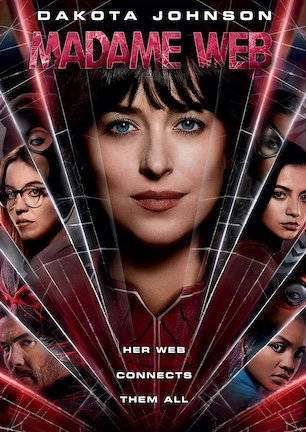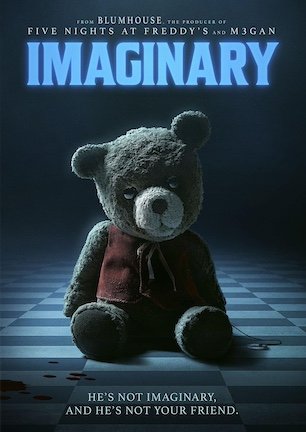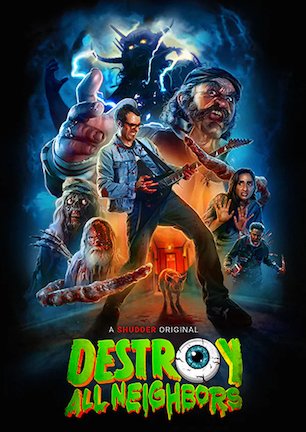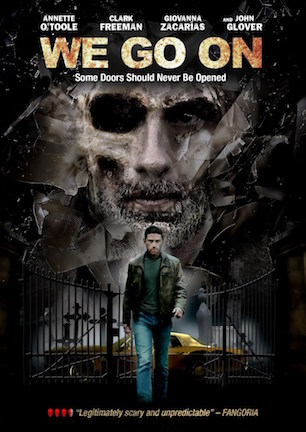Studio: Dark Sky Films
Director: Pollyanna McIntosh
Writer: Pollyanna McIntosh
Producer: Andrew van den Houten
Stars: Lauryn Canny, Bryan Batt, Nora-Jane Noone, Cooper Andrews, Pollyanna McIntosh, John Spud McConnell, Geraldine Singer, Maddie Nichols, Mackenzie Graham, Jeff Pope, Eugenie Bondurant
Review Score:
Summary:
While the ferocious woman who took her from her family conducts a desperate search, a scheming bishop plots to convert a feral teenager for publicity.
Review:
It’s convenient to call “Darlin’” a sequel to “The Woman” and “The Woman” a sequel to “Offspring.” You can go back even further if you’d like, as “Offspring” is also a sequel to series progenitor Jack Ketchum’s debut novel “Off Season.”
Really though, each plot operates independently of its predecessor, making “follow-up” or “spiritual successor” more appropriate monikers. Regardless of how one references these cinematic cousins, narratively they only share one character, or in “Darlin’s” case two characters, in common. So while “The Woman” adds context as a prologue to “Darlin’,” it’s not essential for getting the gist of this story’s setup.
When we left Darlin’ at the end of “The Woman,” she was a pint-sized tike being led into distant wilderness by the eponymous ‘Woman,’ an uncivilized savage who had just slaughtered the little girl’s family. When we reconnect with her at the start of her same-named movie, we see that ten years living with the cannibalistic Woman has devolved Darlin’ into a feral teen no longer able to communicate outside of grunts and growls.
Darlin’ harbors a secret that compels her to finally reject The Woman as a macabre mother figure. An ambulance accident then separates the pair when Darlin’ is admitted to St. Thaddeus Hospital. There, kindly nurse Tony emotionally invests in the unusual girl’s care, although administrators have other ideas.
A conniving bishop sees Darlin’ as the ticket he needs to stop the church from shutting down his school for orphaned girls. If he can rehabilitate Darlin’, surely he’ll be the talk of the town. The Bishop blackmails Sister Jennifer, a recovering junkie and former ward of the orphanage, into joining his self-serving scheme. Together they plot to make Darlin’ prim and proper once again, ensuring a camera is always at the ready to document Darlin’s “miraculous” transformation.
Meanwhile, The Woman grows hungrier and hungrier to reunite with her surrogate daughter. And The Woman is willing to literally bite through the throat of anyone who stands in her way.
“Offspring” primarily functions as a straightforward killer cannibal flick. “The Woman” adds cerebral chills to visceral thrills through its terrifying themes about malformed family dynamics. Those two films are comparatively simple to unpack in terms of intent as well as relative entertainment value.
“Darlin’” on the other hand, presents a more perplexing parsing problem. Its roller coaster car rides tracks of drama, comedy, and commentary at seemingly random intervals. Hitting these hills of stark horror and then sudden humor induces whiplash that scrambles perception. As a result, it’s difficult to discern how much of “Darlin’s” seriousness and pseudo-slapstick is by design and how much of it might be due to a slipped grip on inconsistent tones.
Making her directorial debut here, Pollyanna McIntosh’s accomplished career in front of the camera very much positions her as an actor’s director. She thus gives her cast a long leash to create their characters, to the point where some stray far enough away to play in separate performance pens.
Bryan Batt completely claws loose from any collar by portraying The Bishop as an extreme caricature of a media obsessed zealot deranged by his own doctrine. Batt’s exaggerated embodiment of the manicured sleaze pitches itself perfectly for parody, although Spinal Tapping the volume knob on his buffoonery makes him ear-achingly louder than anyone else.
Cooper Andrews applies an agreeably softer touch to Darlin’s nurse Tony. Tony endears himself to the audience quite quickly, emanating empathy with an easy manner that doesn’t require an excessive amount of screen time to establish. Script-based choices for his characterization come with some questions. For instance, Tony’s boyfriend Richard pops in for a pair of appearances, yet this romantic relationship adds no appreciable insight into Tony regarding his affection for Darlin’.
The seesaw wobbles even more for Nora-Jane Noone’s Sister Jennifer. Even though she is vaguely blackmailed into abetting The Bishop, Jennifer doesn’t express much abhorrence for the situation until she has long been complicit in the conspiracy. Jennifer spends so much time as The Bishop’s willing lackey that when the time comes for her moral turn, her personality hasn’t built the collateral necessary to fund truly moving moments.
As Billy, an eccentric orphan who befriends Darlin’ by showing her how to break the school’s strict rules, Maddie Nichols emerges as the unsung hero on the roster. Others will write the words that rightly lift Lauryn Canny as the movie’s anchor, or Pollyanna McIntosh for her steely-eyed third go as The Woman. But Nichols sweetly balances unhinged cockiness and sympathetic vulnerability to put additional human heart into the painful coming-of-age arc affecting the orphaned girls.
“Darlin’” hits heavy notes concerning sexual molestation, marginalization, abuse of power, and misguided dogma. Sadly, such subtext tends to drown in the din of bloody sight gags and several sore thumbs of comical characterizations.
McIntosh clearly wants “Darlin’” to have some amount of comedic value. Just how much however is unclear.
There’s no reason for The Woman to murder a clown in the hospital’s children’s ward other than highlighting the visual absurdity of seeing her slice up a Ringling Brothers reject. The same goes for a smash cut to The Woman banshee howling while trying to comprehend her first car ride, which incidentally, is a strange inclusion to begin with. It’s not like The Woman is entirely unfamiliar with modernity. She should certainly know what an automobile does in principle, even if she’s never been in one before. That’s only a singular example of how “Darlin’” breaks immersion in the serious side of its fiction by daring to be too tongue-in-cheek.
Speaking as a lapsed Catholic, I’ll add that “Darlin’s” overt condemnation of Catholicism aims to question its potentially problematic placement in social institutions more than it means to lampoon the religion itself. McIntosh handles that satire smoothly enough, even though “Darlin’” knocks at low-hanging fruits like perverted priests and knuckle-rapping nuns. At worst, the scathing swipes are more redundant than they are offensive.
Somewhere amidst the hullaballoo of over-the-top humor and gruesome carnage exists metaphoric material that damns established structure as supposedly superior to living a more natural existence. What did God intend? That’s no more answerable of a question than, what does “Darlin’” intend?
Perhaps I picked up most of what “Darlin’” tries to put down. Still, I can’t come to a concrete conclusion regarding what effect it had on me, and that cuts to the heart of what doesn’t feel right about the film. I decided to assign a favorable three stars out of five for its status as a ponderous curiosity. Truthfully, I’m not sure I can sort a distinct opinion of “Darlin’” after just one confounding viewing.
Review Score: 60







How someone who sees this in a theater or without a notepad can keep everyone and their relationships straight, I have no idea.